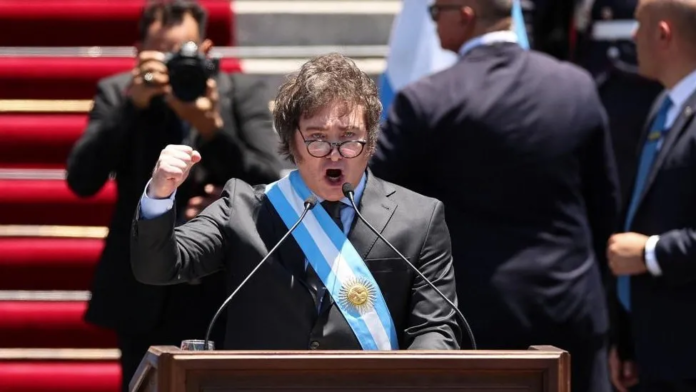Argentina’s new president Javier Milei took his incoming cabinet’s oaths on Sunday afternoon at the Casa Rosada.
Unlike the previous government, there were only nine new ministers instead of 18 and for the first time, the ceremony took place behind closed doors — no press, no livestream.
Earlier on Sunday the new administration revealed its first “Decree of Necessity and Urgency” (Decreto de Necesidad y Urgencia, or DNU) — a type of presidential decree which allows them to legislate without going through Congress first.
The 76-page document confirmed that the Milei government is halving the number of ministries from the previous government, leaving only nine. The drastic reduction was a staple proposal of his electoral platform known as the “Chainsaw Plan.”
Although initially doomed, the Health Ministry survived the chop. The original plan was to have only eight ministries and fold health into the new “Human Capital” ministry, which combines what were formerly the education and labor ministries.
Mario Russo, a cardiologist who previously held a government role in Buenos Aires province, will be the country’s new health minister.
Patricia Bullrich and Luis Petri, the erstwhile presidential ticket for Juntos por el Cambio, were sworn in as security and defense ministers respectively.
This will be Bullrich’s second stint on the job, having held the same role during former President Mauricio Macri’s government (2015–2019).
Following the substantial reduction, these are Milei’s nine ministers plus his new chief of staff (a role typically also sworn in alongside ministers on December 10).

- Chief of Staff Nicolás Posse
- Economy Minister Luis Caputo
- Security Minister Patricia Bullrich
- Defense Minister Luis Petri
- Interior Minister Guillermo Francos
- Health Minister Mario Russo
- Justice Minister Mariano Cúneo Libarona
- Human Capital Minister Sandra Petovello
- Infrastructure Minister Guillermo Ferraro
- Foreign Minister Diana Mondino
By law, the executive power must inform Congress of the DNU within the next 10 days after the decree is published in Argentina’s Official Bulletin. A special commission with members of both chambers then has to analyze the decree’s language and vote on whether it’s valid. The Senate and the Chamber of Deputies then have to vote to approve it or not. Both chambers must reject a decree for it to be annulled.
The incoming Milei administration confirmed most of its government leaders this week, including the new Central Bank head Santiago Bausili — former finance secretary during the Macri administration — and surprise carry-over Marco Lavagna, who will continue as head of the National Institute for Statistics and Census (INDEC, its Spanish acronym)
‘Don’t tread on me’
Earlier on Sunday, Milei made an impromptu speech on the Casa Rosada balcony. His supporters erupted in screams, singing La Renga’s song Panic Show with him. He yelled “Viva la libertad, carajo! (Long live freedom, goddammit”)” three times and the crowd responded “Viva!”
A green flare was lit and a giant inflatable lion head could be seen a few meters away from the gates.
“You know I have built my political career on always telling the truth and that came at a cost. But you know I prefer to tell an uncomfortable truth than a comfortable lie,” Milei said, echoing his speech from earlier on Sunday verbatim and warning of difficult days ahead.
While most people waved the Argentine colors of white and blue, some had yellow Gadsden flags with the phrase “Don’t tread on me” and the image of a snake. “Milei, our dear, the people are with you” they chanted when the new president paused.
Following the swearing-in of his cabinet ministers, Milei is set to attend an interfaith ceremony at the Buenos Aires Cathedral. The final event of inauguration day will be a gala at Teatro Colón at 8 p.m., where Milei will attend a staging of Madame Butterfly.
MORE:

